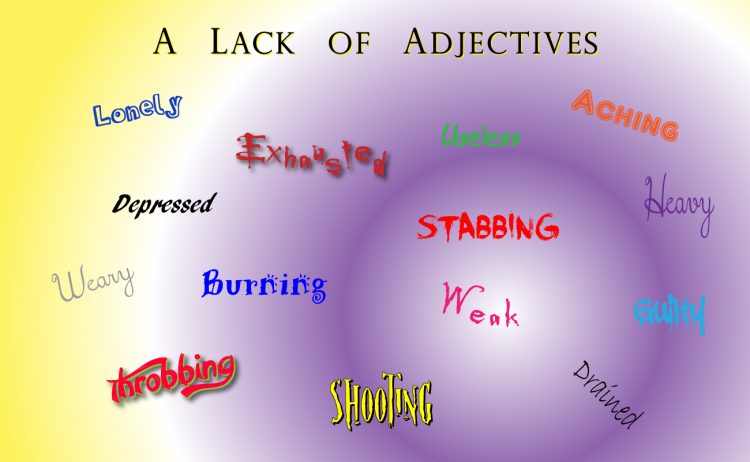How to Explain Chronic Fatigue When Simple Adjectives Aren't Enough
There’s an odd phenomenon that occurs when you become ill with the kind of sickness that isn’t going away anytime soon. At some point, after perhaps the 500th time I heard the words “What’s wrong with you,” I realized I lacked the ability to provide an adequate answer to that question.
This was of particular interest to me because, when chronic fatigue syndrome and fibromyalgia forced me to give up my career as a paralegal, I took up writing and editing from home. Words, you might say, have been my life for many years. So how is it possible that I find myself at a complete loss for words to communicate how I feel…how my body – and even my mind – have betrayed me?
How to Describe Pain
The English language is full of words that describe pain. In fact, the National Institute for Health provides a list of adjectives that patients might use:
- Aching
- Cramping
- Pressure
- Gnawing
- Heavy
- Hot or burning
- Sharp
- Shooting
- Sickening
- Splitting
- Stabbing
- Punishing or cruel
- Tender
- Throbbing
- Tiring or exhausting
But somehow none of these come to mind as adequate descriptions when that crucial question is posed.
Fatigue weighs heavy in my bones, often sucking the life out of me, but can I explain how that actually feels so my husband can understand? Nope. For the first time in my life, words fail me. The bedrock of my struggle to remain even a little bit useful has cracked, and threatens to collapse, for a complete lack of adjectives.
The problem here is much more than my need for words to make everything fit. With no way to communicate the burden of daily tasks undone, loneliness, depression and anxiety creep in. I feel misunderstood, isolated, useless, guilty. There — a string of adjectives that describes how feeling so bad physically makes me feel emotionally. Not really the answer I’ve been looking for, but it’s a start.
While we recognize the need for suitable adjectives in order to express ourselves in our personal lives, this is even more important in working with our healthcare providers. Understanding our conditions from their points of view is the first step to being able to get the care we actually need. Truly useful descriptions of chronic pain and illness stem from being able to answer these basic questions:
- Where is the pain?
- Is it in one place, or does it radiate out?
- How does the pain feel, and how bad is it?
- Is it a constant pain, or does it come and go?
- If it comes and goes, what activities make it come back, make it worse, or make it go away?
- How long have you had the pain?
- How does the pain limit your activities?
How to Describe Chronic Fatigue
Perhaps even more difficult is the challenge of describing chronic, debilitating fatigue. In the early years after my diagnosis as having chronic fatigue syndrome, I was frustrated by people’s responses to my revelation. I couldn’t count the number of times I told someone about my condition, and they responded with “Yeah, maybe I have that – I’m tired all the time too.” I never once countered with the thoughts lurking in my mind: “Maybe it has more to do with the fact that you’re 22 years old, with four kids under the age of 6.” Those mothers are indeed warriors, but they truly had no idea what I was going through. That type of tiredness is normal, and can be relieved by rest and sleep.
The truth is, the term chronic fatigue syndrome – or often called “myalgic encephalomyelitis,” or “CFS/ME” – is not a fancy way of saying someone is tired all the time. The hallmark of this disease is bone-crushing exhaustion, to the point of being weak. This extreme tiredness is not relieved by sleep – in fact, it is often difficult to reach a complete level of sleep, no matter how long the person spends in bed.
This type of tiredness commonly increases following even a small amount of exercise, activity or mental stress. It is often delayed – not setting in for hours or days after the activity, and lasts for days or even weeks afterward.
One person with the condition, Michelle, described in a Facebook post the frustration of non-restorative sleep, and trying to function while exhausted:
“Imagine plugging in a dead cell phone over night. When you awaken, you expect it to be at 100 percent. But when you wake, it’s only at 9 percent and you have to try and function on that 9 percent. You’re never fully charged.”
Words that describe tiredness or fatigue that may help you describe how you feel include:
- Exhausted
- Weak
- Lethargic
- Drained
- Drooping
- Overtired
- Burned out
- Worn down
- Weary
- Feeble
- Heavy
- Listless
Explaining Post-Exertional Malaise
Perhaps one of the most difficult things for people to understand is the concept of “post-exertional malaise,” which is essential delayed tiredness after exertion. For normal people, getting a little exercise is known to increase energy, improve mental sharpness and even to decrease pain. It is this common understanding that has people telling someone with CFS/ME that, if they’ll just get a little exercise, they’ll feel better. In fact, last winter my dear 72-year old mother offered to drive over to my house every day to walk with me – “just around the yard,” she said.
Post-exertional malaise means the person will have less energy following even limited exercise. For many people it gets to the point that even riding in the car, with someone else driving, to run an errand can cause lower energy – to the point of exhaustion for hours, or even days, afterward. This is hard to comprehend for anyone who hasn’t experienced it.
To help someone understand this concept, try having them recall the last time they were seriously ill – perhaps with the flu, or mono, or strep throat, or pneumonia. Remind them how just walking downstairs, or joining the family for dinner during that time wore them out so completely.
Brain Fog
With this extreme fatigue comes difficulty thinking. It becomes hard to converse with others, as words just seem to disappear into thin air just before they roll off the tongue. I remember my son, when he was a teenager and at home, teasing me when I asked him to get something off a top kitchen shelf. I couldn’t tell him I wanted a bowl, but kept trying, with him hovering his hand in front of it, saying, “Come on, Mom, you can say it!” I ended up saying, in a huff, “That round thing you put cereal in!” We laugh about it, of course. If you can’t do that, it’ll take you under fast.
Brain fog extends into not being able to remember things, and just feeling like your head is full of mud (it’s thicker than fog for me). Trying to think in a straight line becomes an impossible task on many days, multi-tasking becomes a thing of the past, and even things like your coordination are affected.
Most people can understand what it’s like to begin saying something, then simply losing your train of thought. Try explaining that this happens to you – not once in a while – but all the time. Using the term brain fog when talking to friends and family helps solidify the term, and may help them to understand you actually have cognitive dysfunction (dysfunctional thinking).
Flu Symptoms
One way I learned to describe the plethora of symptoms that comes with CFS/ME is that I feel like I have the flu every single day. It’s true that, after 25 years, my flu-like symptoms are not as constant, but they include:
- Chronic sore throat
- Swollen lymph nodes in the neck or armpit
- Low-grade fever
- Chronic low temperature
- Frequent nausea
- Heart palpitations
- Unexplained muscle pain
- Joint pain that moves from joint to joint, with no redness or swelling
- Unusual headaches
- Unrefreshing, or non-revitalizing sleep
- Extreme exhaustion following exercise or stress, which lasts more than 24 hours
Over-Reactive Nervous System
Other common complaints of people with CFS/ME, as well as fibromyalgia, include hyper-sensitive skin, sensitivity to light, sensitivity to sounds and sensitivity to too much activity in the vicinity. It is not uncommon to hear complaints like, “Even my hair hurts,” or “Please turn that down!” Irritability is an undeniable fact of being chronically exhausted, and experiencing the other symptoms of chronic illness.
One way to explain having so many symptoms is this: “My immune system is stuck in high gear, as though it believes it is constantly trying to fight off some major infection or nasty virus. In doing this, it drains my body’s energy and other resources, and every system in my body is on edge.”
Finding Peace at Home
The most important thing in all of this is to be able to express to family and other loved ones how your illness affects your daily life. The key to letting guilt take a back seat is knowing that your family knows you’re not making it up, or exaggerating your illness. For that, they need to adopt a longer view, seeing your illness in the long term, rather than the fact that you feel bad today…and today…and today.
I find that writing my thoughts down – as I have them, one at a time – helps me solidify a way to explain myself. You might find it helpful to keep a diary of sorts, even if it’s just to dictate a couple of thoughts into your phone when you have them.
We want to hear your story. Become a Mighty contributor here.



